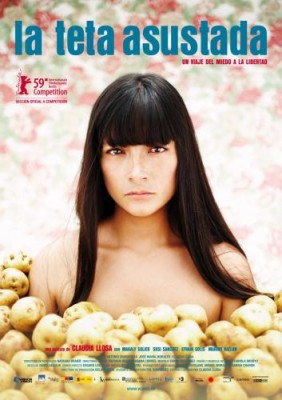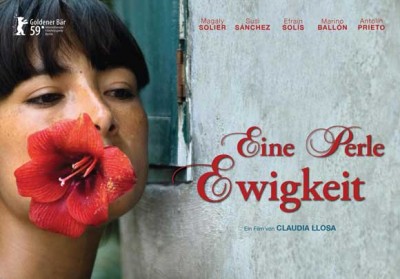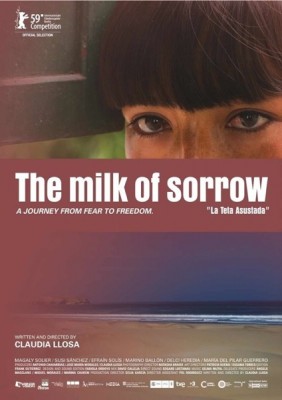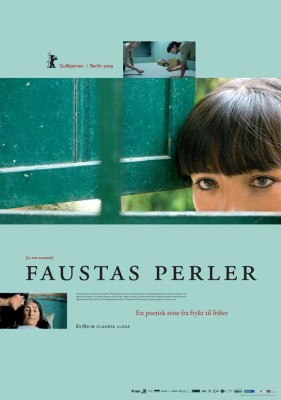| Reviews & Columns |
|
Reviews DVD TV on DVD Blu-ray 4K UHD International DVDs In Theaters Reviews by Studio Video Games Features Collector Series DVDs Easter Egg Database Interviews DVD Talk Radio Feature Articles Columns Anime Talk DVD Savant Horror DVDs The M.O.D. Squad Art House HD Talk Silent DVD
|
DVD Talk Forum |
|
|
| Resources |
|
DVD Price Search Customer Service #'s RCE Info Links |
|
Columns
|
|
|
Milk of Sorrow

The lingering after-effects of wartime trauma are faced head-on by Peruvian writer-director Claudia Llosa in her 2009 film The Milk of Sorrow (the first Peruvian picture ever to be nominated for the Best Foreign Film Oscar), but with an unexpected degree of respect, delicacy, poetry, and mystery. Though Llosa is taking on a large, complex, nightmarish, and intimidatingly recent slice of her nation's history -- the violent anti-communist military suppression in Peru that, by the early '90s, had brought the rapacious, murderous right-wing military/paramilitary forces out of decade-long rural skirmishes and into the city of Lima, Peru's capital/population center -- the film captures the individual significance and consequences of such political/military action, with everything we learn about Peru's troubles emanating from and leading back to Llosa's central character. This is Fausta, a young woman from a poor, tradition-bound village outside Lima whose mother suffered atrocities at the hands of these rampaging, terrorizing military forces and who, according to folk belief and her Fausta's own intuitive feelings of memory, experienced her mother's violation while in the womb and has been afflicted, through her mother's milk, with a damaged, fragile, and sexually deadened existence (a more literal translation of the title would be The Frightened Breast). The Milk of Sorrow tells, with a great deal of thought, care, and empathy (as well as the aesthetic sensibility and filmmaking skill to convey those qualities) the story of Fausta's unusually fraught struggle to grow up and into life and love, somehow facing and surmounting the aftershocks of horror she lives with every day to become a full participant in the world around her, and in her own life.
Fausta is unforgettably embodied by the excellent Peruvian actress Magaly Solier (Blackthorn), who is also a singer/songwriter in real life; her (improvised?) singing the first sound we hear her make, as she sings songs of memory and mourning with her ailing mother. Apparently since Fausta's birth, mother and daughter have been cocooned away in this little room in a village home where we find them at the outset, symbiotically comforting one another for the atrocity they lived through together when the mother was raped, and watched Fausta's father being killed, by the marauding soldiers while pregnant with her daughter. Just before the opening title comes up following this prelude-scene, we realize from Fausta's expression that her mother has literally passed away from the daughter who has, evidently, relied exclusively upon that maternal presence for any security or meaningful human interaction. What ensues over the rest of the film is the story of Fausta's unwilling but obligatory journey out of this stifled, comforted zone into a world full of things that frighten her; at the outset, neither she nor we know whether she will be able to take wing or will shrivel understandably back into the confining, protective shell from which death has finally set her long-suffering mother free.

The presence of the rest of Fausta's family -- an uncle, an aunt, her cousins -- in the home in which Fausta and her mother shared their womb-like room means that, despite being bereft of the one who could understand her, she's not left entirely alone in the world. Her uncle does the best he can to get her through the mourning process (this involves a prolonged preparation of the body and a standoff in which, on the one hand, the body must be buried before Fausta's cousin's wedding, and on the other, Fausta insists upon a decent burial whose logistics and cost are probably too prohibitive) and take proper, special care of her. This involves, for one high priority, getting her to a doctor to examine the irregular feminine bleeding she suffers from. This ailment is, in indirect ways, both the mental and physical manifestation of "the milk of sorrow": Fausta is treating herself with a folk remedy she heard tell of by a friend of her mother's -- one of that prior generation of women who lived in fear of rape as an act of terror -- involving a potato she has attempted to use as a genital barrier, precluding anything like a dating/romantic life, and, as the potato sprouts, inflaming and jeopardizing her reproductive organs internally. She refuses an operation offered by the big-city doctor who informs her aghast uncle of what she's done and makes him take her back home, where her life is similarly jammed, paralyzed, threatening to stagnate, and her kindly uncle's and aunt's best intentions can't stop their efforts from making things worse: Her aunt runs a family business that is, in a cruel contrast with the lonely, asexual existence destiny seems to have had in store for Fausta, the arrangement and catering of elaborate traditional rural Peruvian weddings in which Fausta must reluctantly participate. And with her cousin's own wedding coming up, her uncle is eager to remove the bane of death from their household by disposing of her mother's enshrouded body as quickly as possible, according to Fausta's wishes or not.

Instead, the quiet, fearful, yet stoically independent Fausta insists on fighting her own battle, without the loving but uncomprehending help of those near her, and her chance to do so commences when her aunt sends her off to a day job in the city working as a maid for a wealthy, acclaimed, and renowned singer known as Aida (The Skin I Live In's Suzi Sanchez). The singer's interest in the songs of pain she overhears her maid vocalizing leads to a sort of mentoring relationship that develops between cosmopolitan employer and rural/provincial maid, but a shocking photograph of Aida's late husband posing proudly in full military gear, from which Fausta recoils, is only the most obvious sign that treachery and exploitation are just as likely possibilities as understanding and support from this new "friend." A more promising possibility for connection, integrity, and loyalty comes in the form of Noé, Aida's gardener; he's older than Fausta, humbly stoop-shouldered and gentle, yet strong and discerning -- very unlike either the men on the street, most of whom Fausta is instinctively afraid of, or the cocky best friend of her cousin's groom, whose overt flirtations are sophomoric and off-putting to Fausta in ways he couldn't know. A certain rapport, and the most delicate and tentative of flirtations, develops between Fausta and Noé, one that we feel could be the first step on a path toward letting go of her mother, removing her literally and metaphorically destructive barriers, and unlearning at least some of the mistrust and self-isolation that life and cruel history have until now ruthlessly necessitated for her.
When Llosa uses her observant, considerably fine-tuned visual sensibility to hone in on Fausta and her world, it makes for waves of striking, visually and narratively well-structured feeling; whether she's framed as a tiny figure against the ridges of white sand she traverses between Lima and her outlying village, tracked in close-up through Lima's bustling streets and hospital corridors, or boxed into the too-many, too-spacious doors and rooms of Aida's urban mansion, Fausta's subjectivity permeates all the best parts of the film; the director's sagacity when it comes to the tempo within and between scenes, and to visual and emotional concentration and restraint, dovetail nicely with the clear, naturalistic, but rich lighting and emotionally attuned evocations of color and space contributed by cinematographer Natasha Braier (who also displayed her powerful way with light and lenses to add to In the City of Sylvia's sublimity) to create a highly subjective experience, encompassing some finely wrought, perfectly integrated moments of surrealism and allowing us to see and feel the world the way Fausta does, rendering moot whether or not the "milk of sorrow" syndrome or her adherence to folk songs and remedies as cures are "real," objectively verifiable, or effective; it's Fausta's reality, not "reality," that Llosa means to give us, and this fascinating, eminently sympathetic woman's experience is conveyed with sometimes startling immediacy and fullness, without the constraints of realism, but with a confident and convincing naturalism.

The film's only real missteps, the moments that hold it back from pure and unfettered excellence and make Llosa (for now) somewhat less an artistic force to be reckoned with than a few of her fellow auteurs that are making South America a bright new hope for cinema (e.g., Argentinians Lisandro Alonso (Liverpool) and Lucretia Martel (The Headless Woman), Chileans Pablo Larrain (Post Mortem) and Sebastian Silva (The Maid, etc.), are its intermittent overplaying of its symbolic hand (a shattered piano in a courtyard places undue strain on the possibilities of effective metaphor; a scene in which Noé's offer of candy to Fausta is too-vehemently rejected goes one too far), and a few stretches in which Llosa strays a bit too far away from Fausta and lingers too long on the pageantry of the traditional village marriage ceremonies her family is in the business of facilitating. (Another, more truly and seriously ethnographic film may have been a better place to give these clearly rich folkways their real due; here, they come too close to seeming merely ornamental, superficially thrown in for diversion with no inkling of their roots or meaning -- a bit of exotic, tourist-enticing "flavor" to offset the film's otherwise sobering themes, without enhancing, and too often distracting from, our insight into Fausta, her family, their place and station in the life of their country, and the way they actually live.) But these are only minor detours into slightly disappointing convention in a film that for the most part remains fiercely true to its twin missions of memorializing a history of atrocity and paying tribute to those who bear its mark in their souls and still strive to engage, somehow, with the world, to search for some peace and maybe even happiness. The ultimate impression is that the filmmakers have created an engaging, moving pattern into which Solier has then seamlessly woven her own brilliant work, creating the most indelible feature of a film that also makes a deep, haunting impression in many other ways-- her beautiful performance as Fausta, a woman whose point of view can neither afford nor allow the illusion that the political and the personal are separate entities. Fausta's story brings to vivid life the idea that the struggle of an oppressed person not to succumb to injustice and pain inflicted upon them, but to risk living on and growing into the future while refusing to forget or dilute their scars, is a boldly political act and, in itself, a victory against oppressors.

THE BLU-RAY DISC:
Olive presents The Milk of Sorrow at its original, 1.85:1 theatrical aspect ratio (not at 1.78:1, as slightly mislabeled on the sleeve, but the proof is in the pudding, and it does right by the film) on a transfer that shines, preserving all the variegations and the solidity of color in both DP Natasha Braier's open-air-lit, tan-and-blue exteriors and her dimmer but more layered interiors. Blacks/darks are nice and solid, skin tone is natural, and, though there may be some overuse of digital noise reduction here or there, a healthy amount of the film's celluloid texture has been retained. No edge enhancement is discernible, and the only noticeable aliasing is a slight amount on the film's white-on-black end credits. Overall, a great visual treatment.
Sound:The film's sound arrives via a DTS-HD Master Audio 2.0 track (in Spanish and Quechuan, with non-optional English subtitles) on which all audio, from sung/spoken dialogue to music to ambient noises are clear, rich, and resonant. There isn't a single flaw -- no distortion or imbalance, certainly no crackle or hiss -- in this sonically excellent presentation.
Extras:None.

A young Peruvian woman's coping with the lingering effects of a brutal history are handled with a morally and aesthetically sensitive, urgent yet reflective, unusually thoughtful sensibility in The Milk of Sorrow. Director Claudia Llosa also touches (sometimes meaningfully, other times less so) on a thumbnail ethnography of the Peruvian rural poor and on class relations as they stand in the wake of this history, but her primary responsibility, which she takes very seriously, is to the story of Fausta (the wonderful Magaly Solier, who's well up to a challenging, virtually nonverbal role) as she emerges from the self-protective, post-traumatic cocoon she has shared with her now departed mother. The film, with its measured, starkly composed mise-en-scène and vast desert/mountain landscapes with the Andes in the background, is astonishingly beautiful, and although it chooses not to depict directly the horror that Fausta's mother went through during a crusade of rape and murder conducted by a long-running right-wing military suppression in Peru (a trauma "remembered" by Fausta from the womb, and, according to a folk belief, transmitted elementally through her mother's milk) it never trivializes or beautifies the ugliness Fausta struggles to confront and overcome (it only veers toward selling its important story short on a few occasions, with conventional psychologizing and overly contrived symbolism). The film's slow, sometimes virtually processional-like pacing, moments of lucid surrealism, and mostly well-sustained, intensely focused aura make us feel the weight of what Fausta carries with her. And while Llosa's unblinking camera eye and Solier's amazingly gentle, assured central performance may not offer us any epiphanies or much tangible, external change in the frightened, fragile existence of this courageous character, they do suggest a progressive, very hard-earned, almost miraculous lightening of her load that, by the film's subtle, very moving conclusion, feels momentously liberating. Recommended.
|
| Popular Reviews |
| Sponsored Links |
|
|
| Sponsored Links |
|
|
| Release List | Reviews | Shop | Newsletter | Forum | DVD Giveaways | Blu-Ray | Advertise |
|
Copyright 2024 DVDTalk.com All Rights Reserved. Legal Info, Privacy Policy, Terms of Use,
Manage Preferences,
Your Privacy Choices | |||||||













